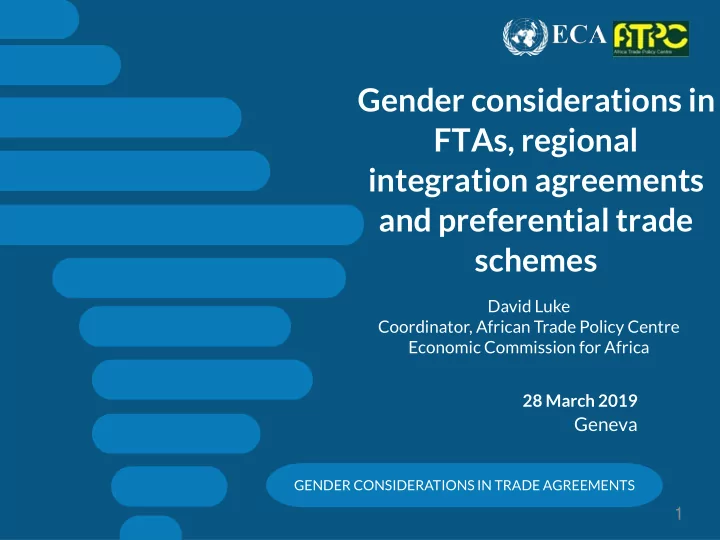

Gender considerations in FTAs, regional integration agreements and preferential trade schemes David Luke Coordinator, African Trade Policy Centre Economic Commission for Africa 28 March 2019 Geneva GENDER CONSIDERATIONS IN TRADE AGREEMENTS 1
Status of AfCFTA and aggregate benefits ECA • As of 26 March 2019, 21 African Union member states have ratified the Agreement. • All but 3 (Benin, Eritrea, and Nigeria) have signed the Agreement since Kigali Summit 21 March 2018. Change in Africa's exports to Africa, by main sectors, most ambitious scenario (as compared to baseline) – in 2040 - US$ bn Industry Agriculture and food Energy and mining 0 5 10 15 20 25 30 35 40 45 50 UNECA.ORG Gender considerations in trade agreements
Aggregate benefits hide variation within and between ECA countries Gender equality impacts of the AfCFTA can be derived from differences in: • Higher barriers to trade • Different levels of formalization • Formal qualifications • Information gaps • Sectoral distribution • Stage of value chain ECA and FES (2017) ex-ante human rights analysis of the AfCFTA identified risks to small holder farmers and informal traders in particular. Gender considerations in trade agreements
Entry points for gender equal AfCFTA ECA Explicit text in trade agreements addressing the issue of gender equality can increase commitments and provide an avenue for civil society and citizens to hold the government responsible for gender-equality in implementation. • The AfCFTA does not have a separate gender chapter. • However its provisions can directly or indirectly support gender equality. DIRECT INDIRECT Preamble Trade facilitation General objective Customs cooperation Technical Assistance, Capacity Building & Cooperation NTB reporting mechanism Double qualification approach Sensitive goods and exclusion lists Rules of origin Liberalization of services UNECA.ORG Gender considerations in trade agreements
Gender-sensitive implementation of the AfCFTA ECA • "Gender" text Design/negotiations • Provisions indirectly supporting gender equality • Continental working group on gender and inclusion Governance • Women's participation in national AfCFT committees • Gender dimension/chapter of the national AfCFTA strategy Implementation • Supporting policies/programmes • Advocacy on the AfCFTA (national, REC, continental) • Support to women's business networks on AfCFTA (national, REC) • Exchange of best practices in supporting women's participation in trade (REC, continental) • Gender equality indicators in the AfCFTA M&E framework M&E (national, REC, continental) • Gender dimension of the AfCFTA Country Business Index UNECA.ORG Gender considerations in trade agreements
ECA THANK YOU! David Luke luke@un.org www.uneca.org/atpc www.uneca.org
Recommend
More recommend